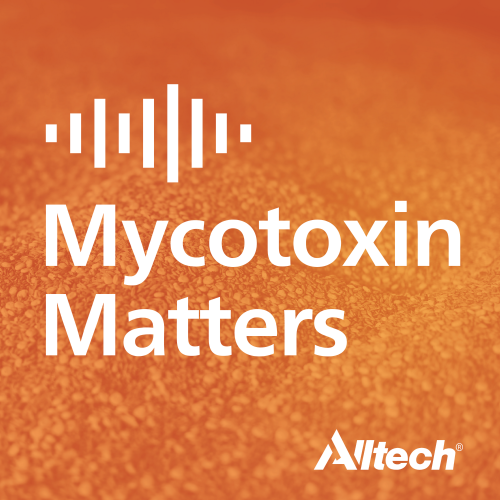Keep ahead of the threat
Stay up to date with the latest mycotoxin information by signing up to our newsletter

Are low levels of mycotoxins dangerous to your livestock?
Author: Dr. Radka Borutova, DVM, PhD: European Technical Support Manager, Alltech Mycotoxin Management
Click below to listen to the Mycotoxin Matters podcast episode with Dr. Radka Borutova hosted by Nick Adams. You can also hear the full audio or listen to the episode on Apple Podcasts or Spotify. You can find an edited transcript at the bottom of the page.
When determining if low levels of mycotoxins are dangerous to livestock, we need to first understand what mycotoxins are. Mycotoxins are poisons produced by moulds and frequently occur in a variety of feedstuffs. Adverse health effects associated with the contamination of feed materials with mycotoxins may lead to acute intoxications, which can be life-threatening. More frequent are sub-acute and, often, sub-clinical alterations of organ function that impair weight gain and reduce productivity. Significant effects of low mycotoxin concentrations can be observed on the immunity and antioxidant systems, which often remain undetected.
Veterinarians should pay attention to:
- Very-difficult-to-see symptoms with little or no awareness.
- The immunity system being the only thing apparently affected.
- Many diseases that are incorrectly diagnosed as the primary problem due to low levels of mycotoxins that usually cause immunosuppression.
- No adequate response to vaccination = low titers of antibodies.
- Live vaccines that can have harmful effects on an animal (they have a potential to become active and cause disease, especially in animals with a weakened immune system; live vaccine is able to create immunosuppression or cause abortions in pregnant individuals).
- Antibiotics used as therapeutics not performing, even if used at a higher dosage or for longer periods.
- The transference of antibodies from breeding animals to offspring being impaired.
- Respiratory diseases of unknown origin or that are difficult to diagnose.
Table 1. Differences between sub-acute (sub-clinical) and clinical symptoms caused by mycotoxins
| Symptoms | |
| Sub-clinical | Clinical |
| Beginning of poor feed conversion | Poor feed conversion |
| Mortality above average | High mortality |
| Some feed rejection | Feed rejection |
| Increased reproductive problems | Major reproductive disorders (cystic ovaries, uterine infection, inability to conceive, increased number of inseminations,
lengthening of the birth–conception interval) |
| Non-uniformity of animals | Organ damages and/or tumours: kidney, liver, pancreas, lymphatic system |
| Soft faeces and diarrhoea | Necrosis of digestive tract |
| Decrease in the general health and increased susceptibility to diseases | Ulcers in the mouth |
| Increased embryonic deaths/abortions | Many embryonic deaths and/or abortions |
Diagnosis of mycotoxin problem
- There are no “safe” or “unsafe” levels of mycotoxins. Low–medium levels might be much more dangerous because they are underestimated and cause sub-clinical effects, such as immune-suppression or suppression of antioxidant system functions.
- There is a need for reliable and readily available laboratory diagnosis of mycotoxins in feedstuff. Many mycotoxins are present in so-called “masked” or “conjugated” form, which cannot be analysed by routine analytical methods. Synergistic and additive interactions between more mycotoxins or mycotoxins and infectious agents should be taken into consideration.
- Veterinarians, feed company representatives and other people involved should ensure that feed samples are correctly taken, identified unmistaken and submitted to reliable analytical laboratories.
- Feed companies would be well advised to perform tests of either unprocessed grain or the final (pelleted or crumbled) product regularly to ensure the wholesomeness of their product. Attention to the possibility of occurrence of mycotoxins should be of particular concern. Rapid test kits based on the ELISA method and lateral flow device (LFD) are already used worldwide.
Conclusion
It is clear that there are no safe levels of mycotoxins in animal feed. Unfortunately, it is not possible to entirely prevent the production of mycotoxins before harvest of agricultural crops, in storage or during processing operations. Nevertheless, consulting nutritionists and veterinarians, along with applying mycotoxin management solutions, can help to minimise the effects of mycotoxin challenges.
Related to this topic:








